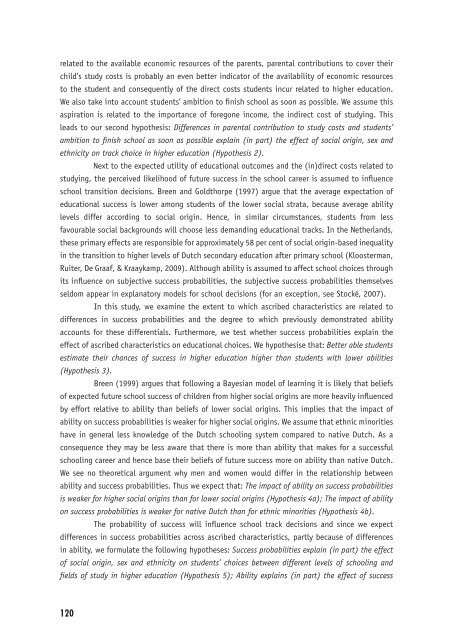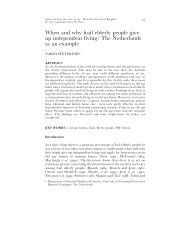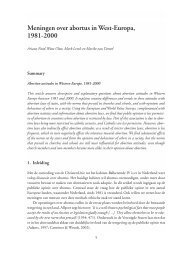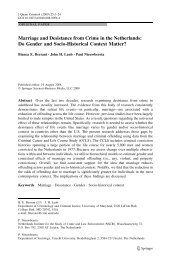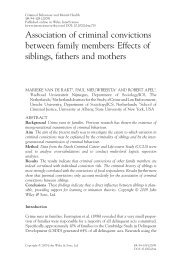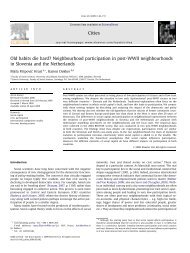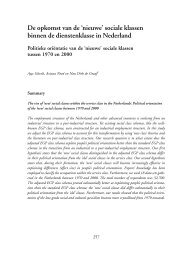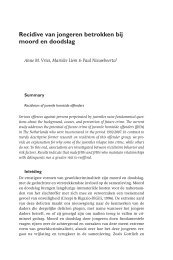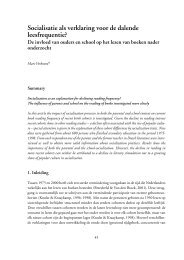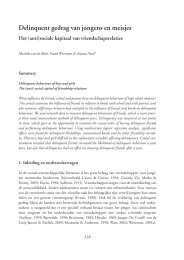Ethnic Hostility among Ethnic Majority and Minority Groups
Ethnic Hostility among Ethnic Majority and Minority Groups
Ethnic Hostility among Ethnic Majority and Minority Groups
Create successful ePaper yourself
Turn your PDF publications into a flip-book with our unique Google optimized e-Paper software.
elated to the available economic resources of the parents, parental contributions to cover their<br />
child’s study costs is probably an even better indicator of the availability of economic resources<br />
to the student <strong>and</strong> consequently of the direct costs students incur related to higher education.<br />
We also take into account students’ ambition to fi nish school as soon as possible. We assume this<br />
aspiration is related to the importance of foregone income, the indirect cost of studying. This<br />
leads to our second hypothesis: Differences in parental contribution to study costs <strong>and</strong> students’<br />
ambition to fi nish school as soon as possible explain (in part) the effect of social origin, sex <strong>and</strong><br />
ethnicity on track choice in higher education (Hypothesis 2).<br />
Next to the expected utility of educational outcomes <strong>and</strong> the (in)direct costs related to<br />
studying, the perceived likelihood of future success in the school career is assumed to infl uence<br />
school transition decisions. Breen <strong>and</strong> Goldthorpe (1997) argue that the average expectation of<br />
educational success is lower <strong>among</strong> students of the lower social strata, because average ability<br />
levels differ according to social origin. Hence, in similar circumstances, students from less<br />
favourable social backgrounds will choose less dem<strong>and</strong>ing educational tracks. In the Netherl<strong>and</strong>s,<br />
these primary effects are responsible for approximately 58 per cent of social origin-based inequality<br />
in the transition to higher levels of Dutch secondary education after primary school (Kloosterman,<br />
Ruiter, De Graaf, & Kraaykamp, 2009). Although ability is assumed to affect school choices through<br />
its infl uence on subjective success probabilities, the subjective success probabilities themselves<br />
seldom appear in explanatory models for school decisions (for an exception, see Stocké, 2007).<br />
In this study, we examine the extent to which ascribed characteristics are related to<br />
differences in success probabilities <strong>and</strong> the degree to which previously demonstrated ability<br />
accounts for these differentials. Furthermore, we test whether success probabilities explain the<br />
effect of ascribed characteristics on educational choices. We hypothesise that: Better able students<br />
estimate their chances of success in higher education higher than students with lower abilities<br />
(Hypothesis 3).<br />
Breen (1999) argues that following a Bayesian model of learning it is likely that beliefs<br />
of expected future school success of children from higher social origins are more heavily infl uenced<br />
by effort relative to ability than beliefs of lower social origins. This implies that the impact of<br />
ability on success probabilities is weaker for higher social origins. We assume that ethnic minorities<br />
have in general less knowledge of the Dutch schooling system compared to native Dutch. As a<br />
consequence they may be less aware that there is more than ability that makes for a successful<br />
schooling career <strong>and</strong> hence base their beliefs of future success more on ability than native Dutch.<br />
We see no theoretical argument why men <strong>and</strong> women would differ in the relationship between<br />
ability <strong>and</strong> success probabilities. Thus we expect that: The impact of ability on success probabilities<br />
is weaker for higher social origins than for lower social origins (Hypothesis 4a); The impact of ability<br />
on success probabilities is weaker for native Dutch than for ethnic minorities (Hypothesis 4b).<br />
The probability of success will infl uence school track decisions <strong>and</strong> since we expect<br />
differences in success probabilities across ascribed characteristics, partly because of differences<br />
in ability, we formulate the following hypotheses: Success probabilities explain (in part) the effect<br />
of social origin, sex <strong>and</strong> ethnicity on students’ choices between different levels of schooling <strong>and</strong><br />
fi elds of study in higher education (Hypothesis 5); Ability explains (in part) the effect of success<br />
120


